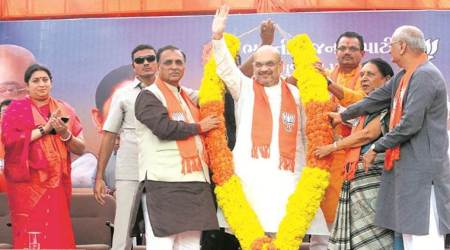 President Trump will outline the policy in a televised speech – only the second of his time in office – from Fort Myers Base in Virginia to an audience of soldiers and their families.
President Trump will outline the policy in a televised speech – only the second of his time in office – from Fort Myers Base in Virginia to an audience of soldiers and their families.
United States President Donald Trump’s new policy on the war in Afghanistan, scheduled to be announced late on Monday night, is likely to include a series of measures designed to coerce Pakistan’s military and intelligence services to abandon their support of the Taliban and its affiliated jihadist networks, two separate Washington DC-based government sources have told The Indian Express.
Few operational details of the new strategy are expected to be spelt out in the speech, but the sources said the President could signal his willingness to destroy jihadist infrastructure beyond Afghanistan’s borders – in practice, by escalating drone strikes in Pakistan’s north-west, as well as special forces raids.
President Trump will outline the policy in a televised speech – only the second of his time in office – from Fort Myers Base in Virginia to an audience of soldiers and their families.
His speech is also expected to announce a modest increase in troop numbers, and reaffirm its financial commitment to the Afghan military’s counter-terrorism campaign.
The speech is being watched closely by Prime Minister Narendra Modi’s national security advisors, who have been telling the United States that the fall of the Afghan government will destabilise south and central Asia.
President Trump’s decision was made at a Friday meeting on Afghanistan, where the hard line counselled by his National Security Advisor, Lieutenant-General Herbert McMaster, prevailed over more cautious voices, the sources said. A veteran of the Afghanistan war, McMaster has long argued that the Taliban cannot be defeated unless Taliban infrastructure inside Pakistan is shut down.
Following a meeting with Pakistan Army chief General Qamar Javed Bajwa in April, McMaster publicly chastised the country’s leaders, saying that “the best way to pursue their interests in Afghanistan and elsewhere is through diplomacy, not through the use of proxies that engage in violence”.
Lisa Curtis, Senior Director for South and Central Asia at the National Security Council, was among those who backed McMaster on Friday, the sources said, arguing that punitive elements were needed to change Pakistan’s policies on Afghanistan, a source familiar with the discussions said.
Early in August, Curtis had met with National Security Advisor Ajit Doval and Foreign Secretary S Jaishankar, on a low-profile visit to New Delhi, for talks on regional security issues.
The meeting on Friday, the sources said, saw Defence Secretary Jim Mattis lead discussions, presenting President Trump with a series of options, ranging from the status quo, to plans for an extended, aggressive commitment in Afghanistan. Plans for imposing a variety of sanctions to punish Pakistan for supporting the Taliban, and rewards for its cooperation, were also discussed in detail.
“I am very comfortable that the strategic process was sufficiently rigorous,” Defence Secretary Jim Mattis said en route to Jordan, where he is scheduled to meet with the country’s King Abdullah.
Friday’s meeting was preceded by a palace coup which saw the exit of President Trump’s chief strategist, Steve Bannon, a controversial far-right figure who had argued against further commitment to the war in Afghanistan. Trump’s son-in-law and key advisor Jared Kushner was also absent, in a sign the President had chosen to lean on processional military and intelligence advice.
President Trump had earlier been expected to provide strategic directions on Afghan policy to the commander of United States forces in Afghanistan, Gen John Nicholson, by mid-July. Instead, on July 19, the President reportedly sought to sack General Nicholson, demanding to know why the 16-year-old war had not been won, and sought “out of the box” ideas from his staff.
In its most recent report to the United States Congress, the Special Inspector-General for Afghan Reconstruction reported that the Taliban and its affiliate now control 11 districts and influence 34 of Afghanistan’s 407 districts, or some 11% of the country’s territory, while the Afghan government controls 97 districts and influences 146 districts, some 60% of the country’s territory.
Helped by a string of rural bases stretching from Helmand, Kandahar, Uruzgan, Zabul and Ghazni, the Taliban are increasingly able to threaten provincial capitals – even though jihadists remain unable to hold them for sustained lengths of time.
Though the war is described by most experts as having reached a level of stalemate, Afghan National Security Advisor Hanif Atmar said the country’s military was losing 29 soldiers a day in combat – levels most experts concur are unsustainable in the long run.

